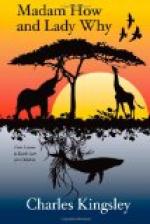sham. Wonder not at the world of man.
Waste not your admiration, interest, hope on it, its
pretty toys, gay fashions, fine clothes, tawdry luxuries,
silly amusements. Wonder at the works of God.
You will not, perhaps, take my advice yet.
The world of man looks so pretty, that you will needs
have your peep at it, and stare into its shop windows;
and if you can, go to a few of its stage plays, and
dance at a few of its balls. Ah—well—After
a wild dream comes an uneasy wakening; and after too
many sweet things, comes a sick headache. And
one morning you will awake, I trust and pray, from
the world of man to the world of God, and wonder where
wonder is due, and worship where worship is due.
You will awake like a child who has been at a pantomime
over night, staring at the “fairy halls,”
which are all paint and canvas; and the “dazzling
splendours,” which are gas and oil; and the
“magic transformations,” which are done
with ropes and pulleys; and the “brilliant elves,”
who are poor little children out of the next foul
alley; and the harlequin and clown, who through all
their fun are thinking wearily over the old debts
which they must pay, and the hungry mouths at home
which they must feed: and so, having thought it
all wondrously glorious, and quite a fairy land, slips
tired and stupid into bed, and wakes next morning
to see the pure light shining in through the delicate
frost-lace on the window-pane, and looks out over fields
of virgin snow, and watches the rosy dawn and cloudless
blue, and the great sun rising to the music of cawing
rooks and piping stares, and says, “This is
the true wonder. This is the true glory.
The theatre last night was the fairy land of man;
but this is the fairy land of God.”
CHAPTER VII—THE CHALK-CARTS
What do you want to know about next? More about
the caves in which the old savages lived,—how
they were made, and how the curious things inside
them got there, and so forth.
Well, we will talk about that in good time: but
now—What is that coming down the hill?
Oh, only some chalk-carts.
Only some chalk-carts? It seems to me that these
chalk-carts are the very things we want; that if we
follow them far enough—I do not mean with
our feet along the public road, but with our thoughts
along a road which, I am sorry to say, the public
do not yet know much about—we shall come
to a cave, and understand how a cave is made.
Meanwhile, do not be in a hurry to say, “Only
a chalk-cart,” or only a mouse, or only a dead
leaf. Chalk-carts, like mice, and dead leaves,
and most other matters in the universe are very curious
and odd things in the eyes of wise and reasonable
people. Whenever I hear young men saying “only”
this and “only” that, I begin to suspect
them of belonging, not to the noble army of sages—much
less to the most noble army of martyrs,—but
to the ignoble army of noodles, who think nothing




